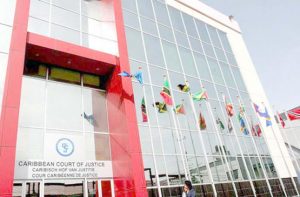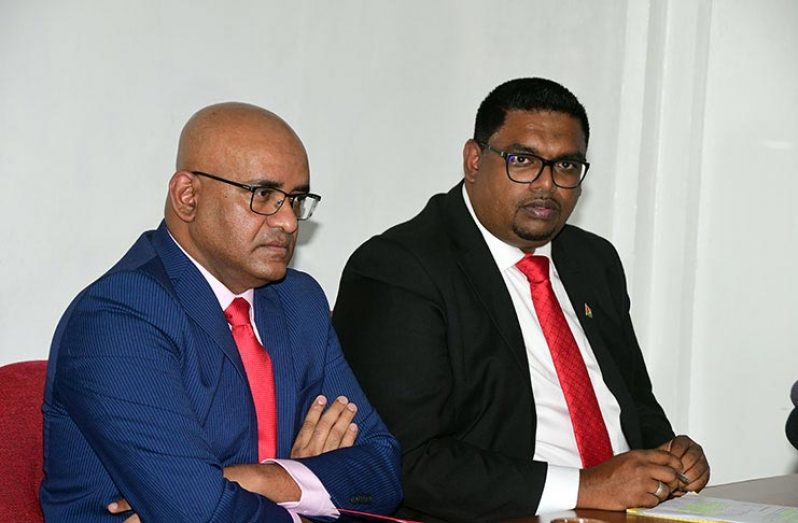…to challenge Court of Appeal’s final decision on ‘valid votes’
ONE day after the Court of Appeal ruled that the election of a President ought to be done using “valid votes” in accordance with the Constitution and Order No. 60, the People’s Progressive Party/Civic (PPP/C) moved to the Caribbean Court of Justice (CCJ) in an attempt to overturn that decision, but Guyana’s Attorney-General and Minister of Legal Affairs Basil Williams says no appeal can be made to the case.
In a majority decision, the Court of Appeal on Monday ordered that the words, “more votes are cast” in Article 177 (2) (b) of the Constitution of Guyana, be interpreted to mean “more valid votes are cast” in relation to the election held on March 2, 2020.
But the decision, which was handed down by Justice of Appeal Dawn Gregory and High Court Judge Justice Brassington Reynolds, with a dissenting vote by Justice of Appeal Rishi Persaud, did not sit well with the PPP/C and its allies, who continue to maintain that the Appellate Court has no jurisdiction to adjudicate in the case brought by North Sophia voter Eslyn David against the Guyana Elections Commission (GECOM) and others.
The PPP/C, through its General Secretary, Bharrat Jagdeo, and Presidential Candidate, Mohammed Irfaan Ali, are now seeking special leave to appeal the Court of Appeal’s decision in the CCJ. The case – Mohammed Irfaan Ali and Bharrat Jagdeo vs Eslyn David, the Chief Elections Officer, the Chairman of the Elections Commission, GECOM, the Attorney-General and others – was filed in the CCJ on Tuesday, and served on the respondents.
JURISDICTION

In the ‘Notice of Application’ seen by the Guyana Chronicle, Jagdeo and Ali have asked the CCJ to set aside the entire ruling of the Court of Appeal, on the basis that it lacked jurisdiction to hear and determine the case, and as such, all orders made as part of the decision be discharged.
Before proceeding to interpret Article 177 (2) (b) of the Constitution, the Court of Appeal had first established that Article 177 (4) had conferred upon it an original constitutional jurisdiction to determine any question relative to the election of the President within the Article.
Notably, Article 177 (4) states: “The Court of Appeal shall have exclusive jurisdiction to hear and determine any question as to the validity of an election of a President in so far as that question depends upon the qualification of any person for election or the interpretation of the Constitution; and any decision of that Court under this paragraph shall be final.”
Both Justices Gregory and Reynolds agreed that Article 177 (4) ought to be read disjunctively, explaining that the Article relates to the questions as to the validity of a President insofar as such questions depend, “(a) upon the qualification of any person for election or (b) upon the interpretation of the Constitution.”
“To my mind, the court is well within the jurisdiction, as accorded to it within the confines of Article 177 (4), which creates two limbs for jurisdiction, and that jurisdiction turns on the election of a president, whether the court is exercising the jurisdiction in relation to qualification or whether the court is exercising its jurisdiction in relation to interpretation, the jurisdiction turns on election of a President, when one considers the wording of Article 177 (4),” Justice Gregory said as she delivered the ruling.
But PPP/C officials, through their Legal Counsel – Trinidad and Tobago’s Senior Counsel Douglas Mendes and Attorney-at-Law Anil Nandlall– contended that the Appellate Court had no jurisdiction to grant any of the orders sought by David in the original appeal.
“The Motion was framed as an application pursuant to Article 177(4) of the Constitution of Guyana, but the relief sought therein, the intended Appellants contend, fall outside the scope and intent of Article 177(4). Rather than being a genuine attempt to invoke the special, original jurisdiction of the Court of Appeal under Article 177(4), the said Motion is a contrived and thinly-veiled attack on the exercise of the powers of the GECOM, and its decision to hold a recount, which said decision and its implementation, and the conduct of the actual recount have arisen in circumstances which have been widely publicised nationally and internationally,” the PPP/C Attorneys said in the Notice of Appeal, as they provided the CCJ with their vision of the history of the electoral process in Guyana, inclusive of the National Recount, which was triggered by Order No. 60 of 2020.
Through their Attorneys, the PPP/C officials submitted to the CCJ that the Court of Appeal erred in Law, and “was plainly wrong” when it found that it had jurisdiction to hear and consider the Notice of Motion filed by David, even though a President, to date, has not been elected, and the issue of the validity has not arisen thus far. This issue was among those addressed by Justice Reynolds before he arrived at his decision that the Court had jurisdiction. The Judge said that the conclusion of the electoral process is not a precondition for Article 177 (4) to be invoked, as he pointed to Article 177 (6).
ORDER NO. 60 AND ITS PUSH FOR CREDIBILITY
While the attorneys, in their application to the CCJ, contended that David’s Motion in the Court of Appeal was “a contrived and thinly-veiled” attack on the exercise of the powers of GECOM, Kim Kyte-Thomas, the Legal Counsel who represented the Chair of the Elections Commission, Justice (Ret’d) Claudette Singh in the Court of Appeal, had conceded that the Order No. 60 laid the grounds for GECOM to determine “a final credible count”.
Order No. 60, which was gazetted on May 4, 2020, and amended on May 29, 2020, was the legal cover used by GECOM, under Article 162 of the Constitution and Section 22 of the Elections Law (Amendment) Act, to facilitate a 33-day National Recount in its quest to determine a final credible count. Paragraph 14, in particular, ties the Elections Commission to declare the results of the General and Regional Elections, based on a “final credible count”.
“Counsel for the second-named respondent, GECOM’s Chair, admitted that GECOM did set as its objective determining the final credible count of votes, but by saying that it would be effectively a usurpation of the High Court’s function, after the fact of its inclusion in the very order which brought the recount into being, concedes an abdication of sorts of the Commission’s responsibilities in that regard,” Justice Reynolds said.
He noted that the term “final credible count” was deployed twice in the Order, while pointing out that it could be found in the third recital, at the beginning of the original order, and in the final paragraph of the amended order. “I conclude that the reasonable inference to be drawn from the inclusion of this formulation of words is that the Commission, having defined it as an objective of the recount, must have intended that those words be given effect to,” Justice Reynolds said.
He added: “Accordingly, I find that GECOM does have a responsibility to determine the final credible count of the results. It would be reasonable to presume that the final credible count would require both quantitative and qualitative assessments of reports, and the summary of observations submitted to the Commission in compliance with Order No. 60 of 2020.”
Though the Order clearly provides for a determination of “a final credible count,” the Elections Commission on June 16 said it had no jurisdiction to determine the credibility and validity of the votes after it was faced with a National Recount Report from the Chief Elections Officer (CEO), Keith Lowenfield which indicated that more than 200,000 votes had been “tainted” due to widespread anomalies and cases of voter impersonation.
Without determining the “final credible count,” the Commission instructed to the CEO to compile and submit an Elections Report by June 18, so as to pave way for the declaration of the Elections Result, and ultimately the swearing in of the President. Moments before the CEO handed in his report, David challenged GECOM’s decision in the Court of Appeal.
INTERIM ORDERS
Meanwhile, outside of the order seeking a reverse of the Court of Appeal’s decision, the PPP/C officials are asking the CCJ for several interim orders to be granted, so as to block the Chief Elections Officer from submitting his report to the Elections Commission in compliance with the Constitution, Order No. 60, and the decision of the Court of Appeal.
Jagdeo and Ali are seeking an interim order: “Restraining the Chief Election Officer from issuing his Report pursuant to Section 96 of the Representation of the People Act or any report in reliance on the decision, inclusive of the modified interpretation of Article 177 (2) (b) of the Constitution of Guyana given by the Court of Appeal, pending the determination of this application and the Appeal for which special leave is [being] sought.”
Further to that, the PPP/C wants an interim order restraining GECOM and or the Chief Elections Officer from determining whether the recounted votes, as tabulated by the Chief Election Officer, constitutes “a final credible count”, or determining the credibility or validity of the tabulated votes.
NO ROOM FOR APPEAL
But, the Attorney-General on Tuesday said that the Appeal filed by the PPP/C officials is ill-conceived, explaining that though the CCJ is Guyana’s apex court, the Caribbean Court of Justice Act, Chapter 3:07 limits the appellate jurisdiction of the Court in Section 4 (3).
That section states: “Nothing in this Act shall confer jurisdiction on the Court to hear matters in relation to any decision of the Court of Appeal which at the time of entry into force of this Act was declared to be final by any law.” Notably, Article 177 (4), which was used by the Court of Appeal to establish jurisdiction in David’s case, states that any decision of the Court under that section shall be final.” The Caribbean Court of Justice Act took effect in 2004, at which time Article 177 (4) of the Constitution was already a part of the laws of Guyana.












